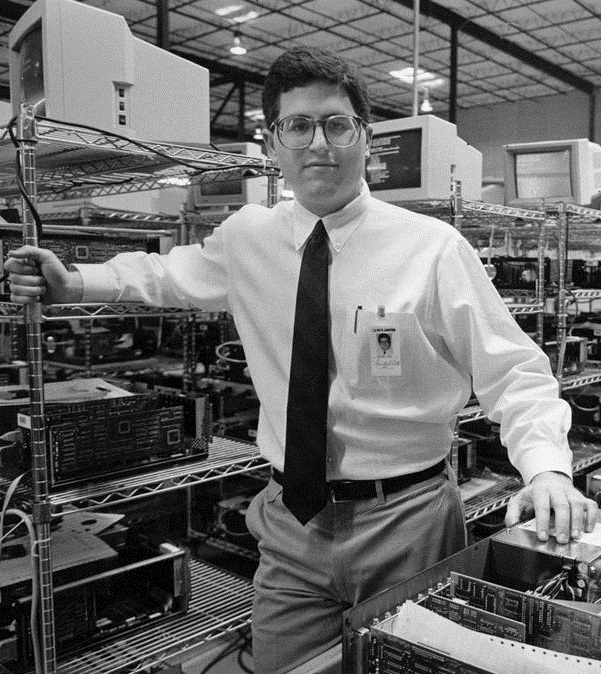Dell's bold cloud bid costs big
 Computer giant Dell is looking to buy data storage company EMC Corp for a mind-bending $US67 billion.
Computer giant Dell is looking to buy data storage company EMC Corp for a mind-bending $US67 billion.
The deal outlined this week would set a record in the technology industry, and could see Dell take a huge step into the rapidly-growing data storage and management market.
Analysts see it as part of a trend for big or mature companies to take advantage of low interest rates and buy out their rivals – reducing competition and creating growth.
In the tech arena, the deal would help Dell diversify from the somewhat stagnant consumer PC market into the more profitable and faster-growing cloud data service market.
Other big makers have made similar moves beyond PCs – a sector whose growth has been hit hard by the rise of tablets, mobiles and other intermediary devices.
Dell’s big rival Hewlett-Packard is set to spin-off its computer and printer unit later this year to focus on the data game, while IBM sold its PC arm a decade ago.
Dell is expected to combine its existing server businesses with EMC's storage and virtualisation tools, which could move it into a position to challenge Cisco, IBM and Hewlett-Packard on cloud computing, mobility and cyber security.
“I don’t think either Dell or EMC were viable over the long run as a standalone; they really needed each other,” said Eric Johnson, dean of the Owen Graduate School of Management at Vanderbilt University.
“Dell was mostly on the consumer side, which is a terrible place to be. EMC had some enterprise products, but not the complete package.”
The deal values EMC at $US33.15 a share , but Dell could get to pay as little as $US24.05 per share in cash, while giving EMC shareholders a special stock with a share price in line with VMWare - makers of cloud-based virtualisation software owned by EMC.
The stock market gave the deal a lukewarm response. EMC shares rose 1.8 percent to $US28.36 after earlier jumping more than 2.5 percent. VMware shares plunged 7.8 percent to $US72.48, decreasing the value of Dell's offer.
It is understood that VMware will remain a publicly traded company, but analysts say there is concern that VMware may lose talented employees due to uncertainty about their future under Dell, which would hurt the company's performance.
Still, EMC's board has approved the merger and is set to recommend that shareholders do the same.
The merger agreement includes a 60-day ‘go-shop’ window for EMC to solicit bids from other parties.
It has also been offered a discounted breakup fee to Dell if a deal is made with another company, according to Reuters reports.
IBM, Cisco, Oracle Corp and Hewlett-Packard are really the only potential suitors for EMC, but insiders say the chances of them putting up a rival offer are slim.
The big question for many is over how the deal will be financed.
Dell is expected to scrape together the cash through a combination of new equity from Dell's owner - founder and Chief Executive Michael Dell, Dell’s investment firm MSD Partners, private equity firm Silver Lake and Singapore state-owned investor Temasek Holdings, the tracking stock, new debt and cash on hand.
Michael Dell took his company off the stock market in a $US25 billion deal two years ago.
The combined companies will be the owners of around $US50 billion in debt, $US32 billion of which is associated with the new transaction, on top of an unspecified amount of refinanced EMC debt.
Insiders say Dell first approached EMC in October 2014 after an unpublicised deal between Hewlett-Packard and EMC collapsed.
In EMC’s most recent earnings report, it posted third-quarter revenue between $US6.05 billion and $US6.08 billion, which was below analysts’ average estimate of $US6.24 billion.
The deal should be sealed between May and October 2016, the companies say.
Advisers for EMC included Morgan Stanley, Evercore Partners Inc, and Skadden, Arps, Slate, Meagher & Flom LLP.
JPMorgan Chase & Co was Dell’s key adviser, while Silver Lake coordinated global financing with Credit Suisse Group AG. Barclays Plc, Bank of America Corp, Citigroup, Deutsche Bank AG, Goldman Sachs Group Inc and RBC Capital Markets providing financing.








 Print
Print